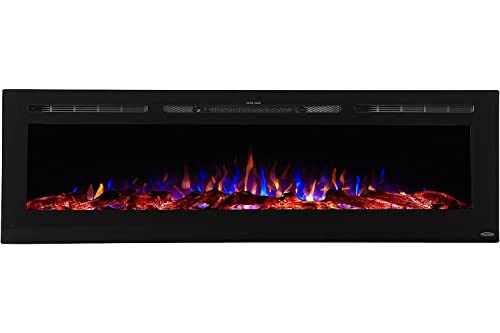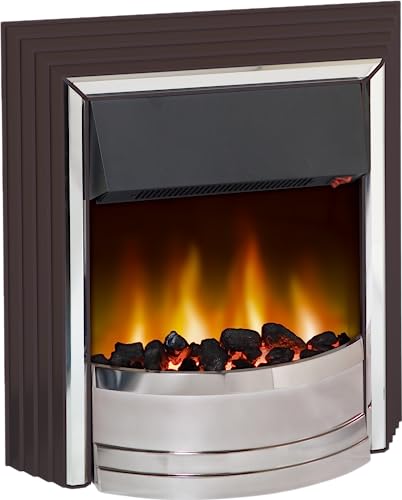Incontestable Evidence That You Need Electric Stove Fire
페이지 정보
작성자 Patrick 작성일24-02-04 01:31 조회24회 댓글0건본문
 How to Avoid inset electric fires uk Stove Fires
How to Avoid inset electric fires uk Stove FiresAlways make sure that you have a smoke alarm as well as an extinguisher for fires in your home. Also, make it a point to make sure your electrical outlets are in good condition by hiring an electrician.
electric suites fireplaces stoves are safe to use, but you should be aware of the dangers and ensure that your appliances are maintained. We'll take a look at the most common reasons that an electric stove can catch fire.
Damaged Wires
The wires that power your stove are insulated, and they're tucked in enough on the underside of the stove to not be a fire hazard. If, however, you notice the wires are discolored or look damaged, it's the time to replace them.
Electrical cords are vital to many components, devices and appliances enabling them to function effectively. However, a damaged wire cuts off the electrical supply to the wire itself and could cause electric shock, fire or both. A simple way to avoid this type of issue is to check and handle with care the electrical cords you have around your home or workplace. This includes avoiding over-crowding of cords, making sure they are coiled tightly and making sure they have tamper-resistant or 3-prong grounded plugs when applicable. You should also inspect extension cords, power strips, and other electrical devices frequently as they tend to fray and become tangled.
If you notice any exposed wires, you must first turn off the power supply to that circuit by turning off the circuit at your breakers box. This will ensure that you don't get a shock while working to repair the wires. Next, identify the electrical circuit that the wires are connected to by looking for an earthing lug or metal grounding rod on the floor near the outlet. Find the fuse box and take out any fuses that are overheating or appear to be in a damaged condition. Fuse boxes are no longer the norm in all homes, but should you still have one to control your electricity then you'll need to switch the fuse that is causing excessive heat to new ones.
If the outer jacket of a wire is damaged it can often be repaired with electrical tape or silicone adhesive. If the insulation has been cut or ripped completely, you must splice the two ends of the wire by using a soldering tool. Once the splice is made it's important to cover it with heat-shrink tubing order to prevent it from re-insulating itself, or becoming damaged in any other way.
Coils that are damaged
The coils of your electric stove are able to be able to withstand a significant amount of wear and wear and tear. However, they might occasionally be damaged. The burner coils are comprised of three layers - the thick metal core that is designed to provide resistance when current passes through it, high-temperature insulation, and a thin metal sheath which protects the insulated layer from direct contact with the pot or pan. If your coils get damaged due to being placed in a rough manner or overheated, they may generate sparks as electricity escapes, increasing the possibility of an electrical fire.
If you spot a single spark coming from the stove's burner, turn it off immediately. Use an oven mitt that is insulated with a rubber cover to hold the pan or pot on the top. If the spark is still present then cover it with a lid and don't cook until you've got repaired or replaced. If you have an extinguisher for a fire ensure that it is in the vicinity and ready to use. Be cautious not to open windows or doors, as this introduces more oxygen, which can help the flames to spread.
In addition to being exposed residue, the wires in your stove may also be damaged by other causes like corrosion and hardening of the wiring. This is common because stoves/cooktops/ranges draw a lot of power, which requires the wiring to heat and cool up repeatedly. This could cause wires to corrode and harden. They also lose their ability to conduct current safely.
Another reason that causes electric stoves to catch on fire is because of faulty switch on the surface. The switch informs the stove what temperature to be and when to switch off. If the switch isn't working correctly it could result in continuous flow of electric current to the coils, which could cause them to overheat and then burn out.
It is important to inspect your electric stove on a regular basis for signs of damage, and to make sure that the electrical outlets and switches are in good in good working order. You should also have an electrician check and replace the outlets in your kitchen if needed, and incorporate regular electrical safety inspections during your home maintenance.
Overloaded Electrical System
If you cook on your stove often but do not maintain it properly the wiring could become worn out. The wires can then begin to heat up or even short and cause the fire to spread. The same goes for extension cords. They're not meant to be used as a substitute of the main electrical cable and can cause fires. The most important thing to do is maintain a regular schedule of maintenance, replacing burnt out appliances as well as bulbs and fuses.
Be cautious when using containers, kitchen towels, or other items that could catch fire. Also, make sure you have a fire extinguisher nearby in case the stove ever does catch fire. You should be able put out a small fire if it's under control. If the fire is larger, you should call for help.
The best way to avoid an electric stove fire is to be vigilant while cooking. The majority of electrical stove fires occur when the cook is distracted and leaves the stove unattended. It could be due to watching television, talking on the phone or getting on their computer. These kinds of distractions are the main reason why people forget to watch their cooking, and end up with a charred and smokey mess.
If you own a gas stove, switching to it can reduce the risk of an fire. This can reduce the number of fires that occur in your home. In fact, homes that cook using Free Standing Electric Fireplaces - Http://Fpcom.Co.Kr/Bbs/Board.Php?Bo_Table=Free&Wr_Id=89832, stoves experience the rate of fire 2.6 times greater than those using gas appliances.
There are a variety of electric stoves to pick from. Some electric stoves are designed to look just like log burners and feature realistic fire effects. Some are modern in design with mirrors and glass that reflect the fire. If you're considering changing your fireplace to an electric one it is important to conduct your research. Make sure you purchase an energy-efficient appliance that has an impressive rating and a reputable warranty to ensure your investment is properly protected.
Stove It was on all night long
It's commonplace to forget to turn off the stove prior to leaving the home. In most cases the stove remains on but it doesn't ignite the food that was cooked and it doesn't cause the possibility of a fire. What happens if you keep your stove on?
It is possible to think that leaving your stove on all night will not cause problems, but you would be wrong. The reason for this is that electrical appliances such as stoves have a tendency to create arcs when they are overheated. This happens when a burner is left on for a long time and, if that happens the wires could become hot and melt. In addition the arcing could cause the wires to become loose which could lead to a fire.
The majority of modern electric stoves have security features to prevent this from happening. For instance, certain newer models come with a feature that will turn off the stove if it has been on for 12 hours. Older stoves may not have this safety feature.
Carbon monoxide poisoning can also be a problem if a stove is left on for a long period of time. Carbon monoxide, which is a colorless and hazardous gas, can be fatal if inhaled for too long. If you suspect that your stove is still operating and is releasing carbon monoxide you must immediately evacuate the area.
It is also recommended to turn off gas at the stove in the event that the meter is located outside your home. This will help ensure that the gas does not ignite the other areas of the house and result in a fire or an explosion.
It is common to overlook turning off the stove. However it is a risky thing to do. In fact, there have been several reports of stoves caught on fire after being left all night. It is advisable to confirm that the stove has been turned off prior to going to bed. Make sure you check the power cords to ensure that they aren't being pulled from the outlet or connected to an electrical device.

댓글목록
등록된 댓글이 없습니다.
 즐겨찾기 추가하기
즐겨찾기 추가하기





 관유정 커뮤니티
관유정 커뮤니티